Project News
January 31, 2017
Project News in January 2017
1. The Lecture by Prof. Yamamoto (JICA Expert to the Project)
Dr. YAMAMOTO Yoshinori (Professor Emeritus, Kochi University), a long-term expert to the Project, delivered keynote lecture "Rice Cultivation and Current Research Topics in Japan with Special Reference to Global Warming" on 11th January 2017 at the 10th Agricultural Research Conference of Yezin Agricultural University on "Climate Resilient Agriculture".
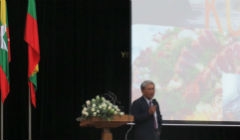 Dr. Yamamoto on the stage (Jan. 11, 2017)
Dr. Yamamoto on the stage (Jan. 11, 2017)
2. Short-term expert training "Climate Change and Agricultural Production"
JICA TCP short-term expert training "Climate Change and Agricultural Production" was implemented by Dr. ANDO Ho (Professor Emeritus, Yamagata University) from 28th January to 12th February with 18 participants from 4 departments (Agronomy, Plant Breeding, Soil and Water Science and Horticulture) of YAU, DOA and DAR.
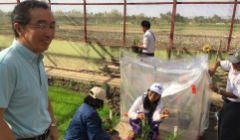 Training by Dr. Ando (YAU Farm: 31st January)
Training by Dr. Ando (YAU Farm: 31st January)
3. Short-term expert training "Integrated Pest Management (IPM)"
On the other hand of wide spread of the use of pesticides, the knowledge and skills of Integrated Pest Management (IPM) or biological control of the pests based on the physio-ecological understanding of insects and pathogens are not well disseminated in Myanmar, because of the lack of information and research on physio-ecological characteristics of pest insects and their natural enemies. In order to contribute to the improvement of current situation and to fostering young generation of YAU in this field of studies, the project invited Dr. NAKAMURA Satoshi (Chief Researcher, JIRCAS) to organize IPM training from 30th January to 7th February, which consisted of 1) major pest insects and current situation of protection, 2) theory and practice of IPM, 3) outline of biological control, 4) practice of biological control, and 5) Useful natural enemies. Total 22 young and midcareer academic staff and graduate students mainly from Department of Entomology and Zoology, and Department of Plant Pathology participated in the training and research trip to Aungban and Pindaya in western Shan State.
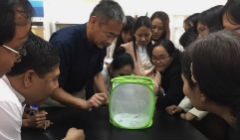 Training by Dr. Nakamura (ELB-1:31st January)
Training by Dr. Nakamura (ELB-1:31st January)
4.Implementation of Pilot Research
1) Each research group in the Pilot Research Program conducted fieldworks as follows.
- 8th, 15th, 22nd and 29th January:
RB-03 group collected insects and re-installed insect traps in 7 Townships in Nay Pyi Taw. - 10th-22nd January::
RC-01-2 group conducted interview on production and sales of sesame in Pakokku Township, Magway. - 18th-19th January:
RC-02-2 and RC-02-3 groups selected and fixed the target trees for detecting pathogens of mango fruit disease in Kume and Sink Kine Township, Mandalay. - 21st January:
RC-02-1 carried out preliminary surveys at three mango-growing farms in Oattaya Thiri Township, Nay Pyi Taw to collect information on flowering of mango trees and farm management in order to select target plots. - 25th January-1st February::
RC-01-2 group interviewed with retailers and oil producers of sesame in Pakokku Township, Magway, and collected information on their sales and constraints they faced. The group also collected statistical data regarding sesame production at the DOA Office of Pakokku TS. - 28th -30th January:
RB01-1 group conducted surveys on horticultural crops at Phyinmana TS in Nay Pyi Taw. - 31st January – 2nd February:
RB01-1 group conducted surveys on leguminous crops at Phyinmana TS in Nay Pyi Taw.
2) Laboratory and in-farm experiments were also conducted using the samples collected through previous surveys.
- RA-01-1 (Plant Breeding group):
Seeding of about 200 local rice varieties/ strains in total, consisting of those collected by the team from various locations, provided by Seed Bank, and bred by YAU (60 strains, F6) was completed, of which about a half of them were transplanted at experimental farm of YAU. In addition, the measurement of the growth and yield components of rice varieties collected at Thanatpin Township, Bago Region, which have adaptable characteristics to deep-water environment, was completed and the data obtained is analysed. - RA-02-1 (Plant Pathology group):
Pathogens of rice blast and leaf blight collected in Zaya Thiri and Phyinmana were continuously cultured, and bacterial specimens from these samples were preserved. - RB-02-1(Plant Pathology group):
Identification of nematode was conducted using soil samples collected in sesame-growing areas in Magwe. - RB-03-1(Entomology and Zoology group):
The data related to chronological and seasonal changes of harmful insects, such as the kind of insects and population, has been accumulated to establish insect alert model. - RC-01-1(Agronomy group):
The change and transformation of oil contents of sesame seeds collected at farms and in supply chains have been measured. - RC-01-2: :
Data analysis for those collected in the fields started.
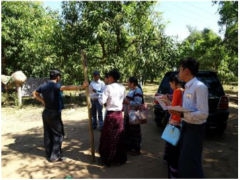 Survey at mango farm (NPT Oattaya Thiri TS)
Survey at mango farm (NPT Oattaya Thiri TS)
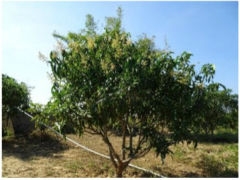 Flowering of mango plant (species:Rubby)
Flowering of mango plant (species:Rubby)
- About JICA
- News & Features
- Countries & Regions
- Our Work
- Thematic Issues
- Types of Assistance
- Partnerships with Other Development Partners
- Climate Change / Environmental and Social Considerations
- Evaluations
- Compliance and Anti-corruption
- Science and Technology Cooperation on Global Issues
- Research
- JICA Development Studies Program / JICA Chair
- Support for the Acceptance of Foreign HRs / Multicultural and Inclusive Community
- Publications
- Investor Relations
